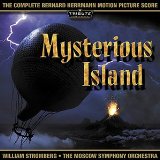The new complete soundtrack CD from the Tribute label
“Are we rising again?”
“No. On the contrary.”
“Are we descending?”
“Worse than that, captain; we are falling!”
“For heaven’s sake heave out the ballast!”
“There! the last sack is empty!”
“Does the balloon rise?”
“No!”
“I hear a noise like the dashing of waves!”
“The sea is below the car! It cannot be more than five hundred feet from us!”
“Overboard with every weight—everything!”
The 1961 second sound version of the film, the article dropped, begins as three men plan their escape from a Confederate prison in Richmond, Virginia. Escape, that is, in an air balloon. “What if there’s a whole regiment guarding it?” one man asks. “Just have to fight the whole regiment, Herbert,” Captain Harding replies. A new prisoner, Gideon Spilitt, inadvertently makes the group four.
And you’re in luck. John Morgan and William Stromberg, apparently joint creators of a new CD label, have recently released three, newly-recorded Herrmann scores. It could be argued that Island might not be as original as Fahrenheit 451, or as atypical as The Kentuckian (the other recordings), but certainly it is the most characteristically Herrmannian.
Present are the expected moans and groans, the dark, amber colors in tubas, double basses, contrabassoons and the like, the splash and hues of the instrumental colors of the impressionists, whom the composer admired. Too, there are the repetitive ostinatos—perhaps the Herrmann trademark—that correspond at the time to the minimalism of Philip Glass and Steve Reich. Maybe, even, Herrmann is an uncredited originator of the movement! Shhh-h-h—–! As for this absence of lush melodies and warm romanticism in the Victor Young or Alfred Newman vein, the late Elmer Bernstein said, “To create good film music, you don’t do it through a series of tunes necessarily; you do it by creating atmosphere, by manipulating the emotions of the audience through sounds and a kind of magic.”
The Moscow Symphony Orchestra under Stromberg plays with all the panache required, and then some. The Herrmann idiom is in their blood, it seems. Stromberg in his conducting and Morgan in this orchestral restoration (assisted by Anna Bonn and the conductor) have been careful to emulate—no, more accurate still, to copy exactly—the original score as recorded and conducted by the composer, recapturing every tempo, inflection, expression and nuance.
